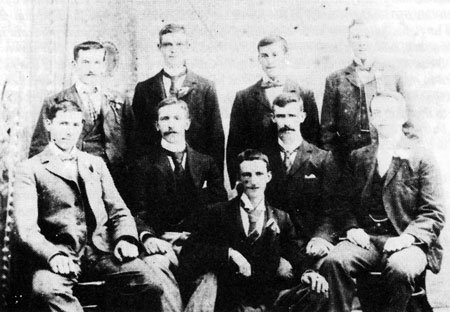History of Barwon Rowing Club
Chapter 4 - The True Heart of Oak 1880-1900
Beyond the wood we come on a wattle grove, now in full bloom, filling all the air with sweetness, and delighting the eye with its green leaves and golden bells. The wind is fresh and strong, young horses gallop about in pure delight, and the lambs skip about merrily, everything seems bright and gay, and we feel as if we had passed out of our ordinary life and become part and parcel of the fair scene before us. It was after sundown when we got back to camp, for a merry tea and a talk over the day's adventures. Looking west, over the lake, all the intervening land between us and the Barrabools had disappeared, and we could only see the hills rising, dark purple, clear from the water's edge. It seemed as if we were suddenly transported onto the shores of some New Zealand lake, and saw the mountains towering above us. Over the hilltops the sky was a greenish blue, a wonderful shade of color which no words could adequately describe, and ever and anon came wafting to our ears the murmur of the distant ocean.
The moon was bright above us when we unwillingly left our camp and turned to row home over the now darkened lakes. This is the time when rowing is the most delightful. The water is smooth, the wind has gone down with the sun, and the crew are all slackened out by the day's exertions, and rapidly fall together. Mile after mile melts away before the long, steady swing and hard drive of the crew; no sound is heard but the musical fall of the blades and the rush of the oars and boats through the water, and we gradually make our way up to the Breakwater and the boathouses by the Barwon bridge, well pleased with our holiday.
By the close of the decade the traffic along the river had increased so much that in September 1889 the captains of Barwon, Grammar and College rowing clubs adopted the following rules:
- Row boats will give way to sailing boats.
- Boats going upstream will keep the north bank, those going downstream the south bank; briefly, "keep the right".
- A row boat passing another will keep outside, i.e. midstream of the boat which it passes, which will hold its own course.
- Boats meeting each other bows on will pass to the right of each other as in walking.
- Everything will give way to a racing boat in practice, provided the racing boat carry in her bows a distinguishing white or light colored flag.
- If two row boats meet at the Breakwater the upstream crew shall cross first.
- Damage shall, in case of an accident, be made good by the crew breaking any of the above rules.
At this time, Barwon's boathouse and reserve were improved. New lockers and various items of gymnastic apparatus, including Indian clubs were provided for the members. More trees were planted and a running track cleared and levelled. The emphasis on general health and fitness produced plenty of stamina, for to attend the Warrnambool Regatta in 1890, the rowers caught a train early on Friday evening, on arrival transferred the boats which had been placed on an earlier train down to the sheds, competed on Saturday, were entertained by the regatta committee on Saturday night, spent Sunday sightseeing and then boarded the 1.30 am train Monday morning, arriving back in Geelong at 5 am in plenty of time to get to work!

Winners Maiden Eight Upper Yarra Regatta 1890
H Buckland (stroke), A Alexander, J Alexander, J Forbes, T Rostock, E Thomson, W Thomson, A Tucker (bow)
